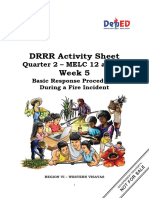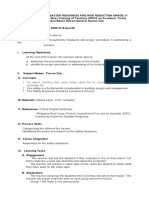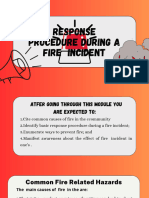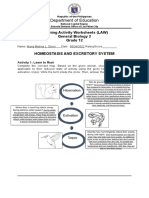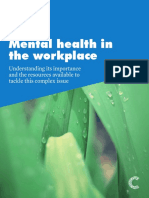Department of Education: Learning Activity Worksheets (LAW) Disaster Readiness and Risk Reduction Grade 12
Department of Education: Learning Activity Worksheets (LAW) Disaster Readiness and Risk Reduction Grade 12
Uploaded by
Maria Bettina DizonCopyright:
Available Formats
Department of Education: Learning Activity Worksheets (LAW) Disaster Readiness and Risk Reduction Grade 12
Department of Education: Learning Activity Worksheets (LAW) Disaster Readiness and Risk Reduction Grade 12
Uploaded by
Maria Bettina DizonOriginal Title
Copyright
Available Formats
Share this document
Did you find this document useful?
Is this content inappropriate?
Copyright:
Available Formats
Department of Education: Learning Activity Worksheets (LAW) Disaster Readiness and Risk Reduction Grade 12
Department of Education: Learning Activity Worksheets (LAW) Disaster Readiness and Risk Reduction Grade 12
Uploaded by
Maria Bettina DizonCopyright:
Available Formats
Republic of the Philippines
Department of Education
National Capital Region
Schools Division Office of Las Piñas City
Learning Activity Worksheets (LAW)
Disaster Readiness and Risk Reduction
Grade 12
Name: Maria Bettina L. Dizon ___ _ Date: 12/17/2021_ Rating/Score _
FIRE RESPONSE, EMERGENCY, AND EVACUATION PLAN
Activity 1: True or False
Directions: Read each statement below carefully. Write T on the line if you think a
statement is TRUE. Write F on the line if you think the statement is
FALSE.
T 1. Once a fire has started, it will continue to burn as long as there are fuel and
oxygen to feed it.
F 2. All classes of fires can be safely extinguished by applying large quantities
of water to them.
T 3. You should not try to use a fire extinguisher to put out a fire unless you have
been trained about how to do it.
T 4. If a fire occurs, anyone can use the acronym "R.A.C.E." to guide them in
responding to the emergency.
T 5. In a fire emergency, patients who are in immediate danger from smoke or
flames should be removed from the hazard area to a "safe
refuge" location.
T 6. You can minimize your chances of inhaling smoke during a fire evacuation
by staying as close to the floor as possible.
T 7. Careless smoking often provides the source of ignition for fires that may occur
anywhere.
F 8. Electrical equipment should be inspected for damage or missing parts every
week.
T 9. Patients in the hospitals should not be allowed to use shavers, hairdryers,
coffee makers, or other small appliances in their rooms without
official approval.
T 10. An "overload" can occur in an extension cord if it is connected to a
device that draws more current than the cord can safely
handle
Q2 Week 5 (Learning Activity Worksheet) Page 1 of 8
Target Competency: Apply basic response procedures during a fire incident (DRR11/12-Ile-f-40).
Activity 2: What are the potential dangers!
Directions: Discuss the dangers you could face during a fire hazard. What action will
you take in response to each situation? Put details in the plan below.
DANGER ACTION
Flammable liquids that can contribute to the Keep flammable liquids in a proper container.
lethality of the fire, causing multiple damages, Only place them in areas that are safe and
injuries, or casualties. well-ventilated. Check them once in a while
for any leaks.
Objects that block fire exits or emergency Always keep the fire exits and emergency
stairways which can delay evacuation during a stairways clear.
fire.
Chemicals that can react with fire, causing it to Don’t store chemicals unless you are trained
be bigger and cause more damages. for it. Only store it in safe containers that are
fit for the specific chemical you are handling.
Keep it away from tight spaces.
If there is a lack of fire extinguishers, it can Always keep a fire extinguisher around in case
enlarge a fire. Fire extinguishers can help in of fires. Remember to check it once in a while
putting a fire out before it even causes too much as well for any leaks or if it’s expired.
damage.
Lack of knowledge on how to deal with fire Educate yourself on how to deal with fire
which can cause delays in evacuation as well as hazards. The more you know about how to act
possible damage, injury, and casualty. when there is a fire, the better you can respond
and help save yourself and others from it.
Q2 Week 5 (Learning Activity Worksheet) Page 2 of 8
Target Competency: Apply basis response procedures during fire incident. (DRR11/12-Ile-f-40).
Q2 Week 6 (Learning Activity Worksheet) Page 3 of 8
Target Competency: Recognize the importance of DRR on one’s life. (DRR11/12-Ilg-h-43).
You might also like
- Template Initial ERA ReportDocument20 pagesTemplate Initial ERA ReportIma Hisham100% (3)
- Industrial Safety QBDocument55 pagesIndustrial Safety QBMAHESH V71% (17)
- Factsheet DuBiotechDocument4 pagesFactsheet DuBiotechajishkNo ratings yet
- Emergency Action Plan: Group 4 MembersDocument43 pagesEmergency Action Plan: Group 4 MembersAileron PelayoNo ratings yet
- Fire Safety and Disaster Response in Care Facilities: Teaching GuideDocument9 pagesFire Safety and Disaster Response in Care Facilities: Teaching GuideAnonymous qKstwCu7No ratings yet
- DRRR - Q4 - Week5 - FIRE EMERGENCY AND EVACUATION PLAN PROCEDURE DURING A FIRE INCIDENTDocument21 pagesDRRR - Q4 - Week5 - FIRE EMERGENCY AND EVACUATION PLAN PROCEDURE DURING A FIRE INCIDENTHeader QuiliopeNo ratings yet
- Emergency Responce Procedure TrainingDocument33 pagesEmergency Responce Procedure TrainingHarvey Sebastian100% (1)
- DRRR Activity Sheet 56Document4 pagesDRRR Activity Sheet 56Sam Kim 3No ratings yet
- DRR-Lay OutDocument12 pagesDRR-Lay OutMa. Cristina UyNo ratings yet
- Safety Manual UpdatedDocument22 pagesSafety Manual UpdatedThanoj Kumar K100% (2)
- Inbound 3132460493347427321Document55 pagesInbound 3132460493347427321Gino DorojaNo ratings yet
- VolcanoDocument10 pagesVolcanoRhea Kristine C. MateoNo ratings yet
- DRR Quarter 4 Week 7Document5 pagesDRR Quarter 4 Week 7Shastine ClaorNo ratings yet
- Earthquake Drill and Fire PreventionDocument19 pagesEarthquake Drill and Fire PreventionMARIA THEA CALAGUASNo ratings yet
- DRRM Awareness-CarreonDocument6 pagesDRRM Awareness-CarreonShaine Michael CarreonNo ratings yet
- 01-02 Module 6 Workplace Emergency PreparednessDocument27 pages01-02 Module 6 Workplace Emergency PreparednessBryan ArabitNo ratings yet
- TLE 7 - 4th Quarter, Week 8Document35 pagesTLE 7 - 4th Quarter, Week 8kunejoseNo ratings yet
- Las Shs DRRR Melc 12-And-13 q2 Week-5Document8 pagesLas Shs DRRR Melc 12-And-13 q2 Week-5PHILIP MALANDACNo ratings yet
- Week3Q4 LAS Science6 FinalDocument8 pagesWeek3Q4 LAS Science6 FinalFrances Quibuyen DatuinNo ratings yet
- DRR Q2 Module 5 Module Phases of Fire Emergency EMPING V Copy 1Document17 pagesDRR Q2 Module 5 Module Phases of Fire Emergency EMPING V Copy 1cloydsolis0100% (1)
- Calamity and Disaster PreparednessDocument62 pagesCalamity and Disaster PreparednessChrisNo ratings yet
- Emergency Response ProcedureDocument14 pagesEmergency Response ProcedureRon Julienne RebugioNo ratings yet
- Competency #39 (Version 2)Document3 pagesCompetency #39 (Version 2)Jude TanNo ratings yet
- DRRR Las Q4 WK 5 To WK 8Document95 pagesDRRR Las Q4 WK 5 To WK 8Jay AndresNo ratings yet
- Weekly TBT - Fire Protection and Prevention Flammable & Hazardous MaterialDocument3 pagesWeekly TBT - Fire Protection and Prevention Flammable & Hazardous Materialrowell.vegaNo ratings yet
- 4th+Quarter+Exam+Review 2Document60 pages4th+Quarter+Exam+Review 2vyndiesel227No ratings yet
- DRRR Activity Sheet 34Document4 pagesDRRR Activity Sheet 34Sam Kim 3No ratings yet
- Response Procedure During A Fire IncidentDocument33 pagesResponse Procedure During A Fire IncidentJohn Lloyd GenerosoNo ratings yet
- Disaster Awareness and PreparednessDocument15 pagesDisaster Awareness and PreparednessAngeloNo ratings yet
- DRRR12 - Q2 - Mod4 - Fire Hazards - V4Document21 pagesDRRR12 - Q2 - Mod4 - Fire Hazards - V4Hpesoj Semlap88% (8)
- DRRR Quarter 4 Module 5Document24 pagesDRRR Quarter 4 Module 5Juzzley Casiño BalanNo ratings yet
- DRRR Module 2 Week 2 4thQ AnswerDocument9 pagesDRRR Module 2 Week 2 4thQ AnswerAshley Jade DomalantaNo ratings yet
- Aw 201Document11 pagesAw 201Lo M'hNo ratings yet
- Module 5b Lesson 2Document9 pagesModule 5b Lesson 2Meg SuratNo ratings yet
- module-5Document19 pagesmodule-5Lion Rj. AboyotNo ratings yet
- LAS Grade8 ACP Q4Week4Document4 pagesLAS Grade8 ACP Q4Week4maercarreon82No ratings yet
- Fire Loss ControlDocument18 pagesFire Loss ControlAriel AlcantaraNo ratings yet
- CAT-Module-Q1 Week-5-Disaster PreparednessDocument17 pagesCAT-Module-Q1 Week-5-Disaster Preparednessrichardjuanito.estarisNo ratings yet
- Bped 125 Midterm Exam ReviewerDocument10 pagesBped 125 Midterm Exam ReviewerdiarydenieNo ratings yet
- By: Ashok Menon, Director Directorate of Fire and Emergency Services, Government of GoaDocument5 pagesBy: Ashok Menon, Director Directorate of Fire and Emergency Services, Government of GoaVinod ChaudhariNo ratings yet
- SDS-K8418ADocument9 pagesSDS-K8418Akavitaprasad0515No ratings yet
- DRRR NotesDocument16 pagesDRRR NotesSarah Mae SambayonNo ratings yet
- Q4 TLE AFA Horticulture 7 8 Week4Document3 pagesQ4 TLE AFA Horticulture 7 8 Week4myehuligangaNo ratings yet
- Management- TornadoDocument5 pagesManagement- TornadoBramwel Muse (Gazgan bram)No ratings yet
- Natural Disasters Sequencing Comprehension Presentation in Colorful Realistic StyleDocument34 pagesNatural Disasters Sequencing Comprehension Presentation in Colorful Realistic Stylekenneth.fuentiblancaNo ratings yet
- SLM 9-Week 4-Grade1112drrr-2nd Quarter-Fire Safety MeasuresDocument20 pagesSLM 9-Week 4-Grade1112drrr-2nd Quarter-Fire Safety MeasuresRomel Bayaban100% (1)
- 9 Emergency Responce PlanDocument4 pages9 Emergency Responce PlanDinesh KanukolluNo ratings yet
- Risk Reduction ManagementDocument17 pagesRisk Reduction ManagementJurie BalandacaNo ratings yet
- Memorandum-No.11-2022guidelines On EvacuationDocument4 pagesMemorandum-No.11-2022guidelines On EvacuationJoan EsguerraNo ratings yet
- Grade 7 TLE HOUSEHOLD SERVICESDocument5 pagesGrade 7 TLE HOUSEHOLD SERVICESRoswlle100% (1)
- Selfstudys Com FileDocument9 pagesSelfstudys Com FileRidamir1234No ratings yet
- SOP Fire ExtinguishersDocument5 pagesSOP Fire ExtinguishersYonatn DebebeNo ratings yet
- Ix-A - 15 - Grace Karl Rego - Disaster Mangement ProjectDocument17 pagesIx-A - 15 - Grace Karl Rego - Disaster Mangement Project6 A 131 Grace RegoNo ratings yet
- DLP Fire Drill, Earthquake, First AideDocument6 pagesDLP Fire Drill, Earthquake, First AideIvy MagdayNo ratings yet
- Before An Emergency: 1. Be PreparedDocument2 pagesBefore An Emergency: 1. Be PreparedKang ChulNo ratings yet
- Disaster ManagementDocument25 pagesDisaster ManagementLakshana DharaniNo ratings yet
- Risk Reduction: 10 Basic First Aid Training Tips & Procedures For Any EmergencyDocument2 pagesRisk Reduction: 10 Basic First Aid Training Tips & Procedures For Any EmergencyannoyNo ratings yet
- Janine CODocument36 pagesJanine CONenia J O. SienesNo ratings yet
- Disaster Prevention and MitigationDocument12 pagesDisaster Prevention and MitigationAliyah Francine Gojo CruzNo ratings yet
- SEMI DETAILED L-WPS OfficeDocument5 pagesSEMI DETAILED L-WPS Officeromeldivinagracia2No ratings yet
- What Should You Do in Case of A Disaster?Document11 pagesWhat Should You Do in Case of A Disaster?PenelopeNo ratings yet
- DRRRSHS - q2 - Mod5 - Community-Based Disaster Risk Reduction and Management For PreparednessDocument19 pagesDRRRSHS - q2 - Mod5 - Community-Based Disaster Risk Reduction and Management For PreparednessAlhzene PanesNo ratings yet
- How to Prepare for Natural Disasters: A Family Emergency Readiness PlanFrom EverandHow to Prepare for Natural Disasters: A Family Emergency Readiness PlanNo ratings yet
- Department of Education: Republic of The PhilippinesDocument3 pagesDepartment of Education: Republic of The PhilippinesMaria Bettina DizonNo ratings yet
- Department of EducationDocument3 pagesDepartment of EducationMaria Bettina DizonNo ratings yet
- Department of Education: Learning Activity Worksheets (LAW) Disaster Readiness and Risk Reduction Grade 12Document3 pagesDepartment of Education: Learning Activity Worksheets (LAW) Disaster Readiness and Risk Reduction Grade 12Maria Bettina Dizon100% (2)
- Dizon 21stlit q1 Law2Document4 pagesDizon 21stlit q1 Law2Maria Bettina DizonNo ratings yet
- Department of Education: Learning Activity Worksheets 3 21 Century Literature From The Philippines and The World Grade 12Document3 pagesDepartment of Education: Learning Activity Worksheets 3 21 Century Literature From The Philippines and The World Grade 12Maria Bettina DizonNo ratings yet
- English For Academic and Professional Purposes: Quarter 4 - Module 1 Academic TextsDocument35 pagesEnglish For Academic and Professional Purposes: Quarter 4 - Module 1 Academic TextsMaria Bettina Dizon50% (2)
- Department of Education: Learning Activity Worksheets #3 Quarter 4 Media and Information Literacy Grade 12Document1 pageDepartment of Education: Learning Activity Worksheets #3 Quarter 4 Media and Information Literacy Grade 12Maria Bettina DizonNo ratings yet
- Department of Education: Learning Activity Worksheets (LAW) General Biology 2 Grade 12Document5 pagesDepartment of Education: Learning Activity Worksheets (LAW) General Biology 2 Grade 12Maria Bettina DizonNo ratings yet
- Learning Activity Worksheets #2 Reading and Writing Skills: Department of EducationDocument2 pagesLearning Activity Worksheets #2 Reading and Writing Skills: Department of EducationMaria Bettina DizonNo ratings yet
- Writing Research Report: Name: Maria Bettina L. Dizon Grade & Section:12-Diplomacy Date: 05/24/2022 ScoreDocument3 pagesWriting Research Report: Name: Maria Bettina L. Dizon Grade & Section:12-Diplomacy Date: 05/24/2022 ScoreMaria Bettina DizonNo ratings yet
- Dizon Emtech q2 IndivptDocument1 pageDizon Emtech q2 IndivptMaria Bettina DizonNo ratings yet
- Lesson: Manipulative and MultimediaDocument3 pagesLesson: Manipulative and MultimediaMaria Bettina Dizon100% (1)
- Lesson Creating and Evaluating Media Forms: What I Need To KnowDocument2 pagesLesson Creating and Evaluating Media Forms: What I Need To KnowMaria Bettina DizonNo ratings yet
- Department of Education: Learning Activity Worksheets (LAW) General Biology 1 Grade 12Document4 pagesDepartment of Education: Learning Activity Worksheets (LAW) General Biology 1 Grade 12Maria Bettina DizonNo ratings yet
- Philo Worksheet Week 2Document3 pagesPhilo Worksheet Week 2Maria Bettina DizonNo ratings yet
- Department of Education: Learning Activity Worksheets (LAW) General Biology 1 Grade 12Document4 pagesDepartment of Education: Learning Activity Worksheets (LAW) General Biology 1 Grade 12Maria Bettina DizonNo ratings yet
- Department of Education: Learning Activity Worksheets (LAW) General Biology 1 Grade 12Document3 pagesDepartment of Education: Learning Activity Worksheets (LAW) General Biology 1 Grade 12Maria Bettina DizonNo ratings yet
- Mil Q3 Law4Document4 pagesMil Q3 Law4Maria Bettina DizonNo ratings yet
- News and Media Literacy. Common Sense Media.: SourceDocument3 pagesNews and Media Literacy. Common Sense Media.: SourceMaria Bettina DizonNo ratings yet
- Department of Education: NAME: Maria Bettina L. Dizon - Score: - GRADE & SECTION: 12-Diplomacy Teacher: Ms. MorialDocument3 pagesDepartment of Education: NAME: Maria Bettina L. Dizon - Score: - GRADE & SECTION: 12-Diplomacy Teacher: Ms. MorialMaria Bettina DizonNo ratings yet
- Mil Q3 Law2Document4 pagesMil Q3 Law2Maria Bettina DizonNo ratings yet
- Department of Education: Learning Activity Worksheets (LAW) Disaster Readiness and Risk Reduction Grade 12Document5 pagesDepartment of Education: Learning Activity Worksheets (LAW) Disaster Readiness and Risk Reduction Grade 12Maria Bettina Dizon100% (1)
- Company Profile International 28 10 2021 BDDocument40 pagesCompany Profile International 28 10 2021 BDMuthana JalladNo ratings yet
- Msds Lubematic Wire - PadsDocument5 pagesMsds Lubematic Wire - PadscarlosNo ratings yet
- Stat Instr 1992-2966 PPER 2966Document18 pagesStat Instr 1992-2966 PPER 2966Mohammed NabilNo ratings yet
- 20-Summary of Legal Requirement2Document36 pages20-Summary of Legal Requirement2Mel YusoffNo ratings yet
- Environmental Professional ResumeDocument4 pagesEnvironmental Professional ResumeThe order of the 61st minuteNo ratings yet
- Introduction To Occupational Safety and HealthDocument24 pagesIntroduction To Occupational Safety and HealthHairul NohNo ratings yet
- Notification of Company's Safety Milestone: Brenda L. VillafuerteDocument1 pageNotification of Company's Safety Milestone: Brenda L. VillafuerteRuel BariaNo ratings yet
- NT WHS Legal Procedure and RegisterDocument17 pagesNT WHS Legal Procedure and RegisterWahyu Endra PurwantoNo ratings yet
- SafetyDataSheetSDS Royco27Lubricant EnglishUnitedStates 10112020Document14 pagesSafetyDataSheetSDS Royco27Lubricant EnglishUnitedStates 10112020Nathalya MatiasNo ratings yet
- Safety Awareness TrainingDocument7 pagesSafety Awareness TrainingIGede Sumantra50% (2)
- Kiswel Welding Wire CompositionDocument6 pagesKiswel Welding Wire CompositionEdo EdgarNo ratings yet
- IdemitsuDocument28 pagesIdemitsuYulia M. SNo ratings yet
- CR6.1 Construction SupervisorDocument3 pagesCR6.1 Construction SupervisorRuan Joubert (Owen)No ratings yet
- Detect and Manage Pharmaceutical Health Hazards and ActDocument91 pagesDetect and Manage Pharmaceutical Health Hazards and ActAklilu Samuel KuchucheNo ratings yet
- CW 100 Safty Data SheetDocument7 pagesCW 100 Safty Data SheetMarjanalbahar TecSerNo ratings yet
- Forecourt Risk AssessmentDocument8 pagesForecourt Risk AssessmentsalesNo ratings yet
- Hempaline Defend 630 Base 3782910000 En-UsDocument10 pagesHempaline Defend 630 Base 3782910000 En-UsAnuar SalehNo ratings yet
- Arc Rha Ag 1+SDSDocument5 pagesArc Rha Ag 1+SDSkoms cattieNo ratings yet
- The National Examination Board in Occupational Safety and Health Unit Igc1: Management of Health and SafetyDocument2 pagesThe National Examination Board in Occupational Safety and Health Unit Igc1: Management of Health and SafetyAnees AslamNo ratings yet
- SDS KM TN912 (958) 10 02 21 2Document7 pagesSDS KM TN912 (958) 10 02 21 2Lloyd JacksonNo ratings yet
- 14A Safety-Data-Sheet EnglishDocument5 pages14A Safety-Data-Sheet EnglishInspectorNo ratings yet
- Evaluate and Control Hazards and RisksDocument36 pagesEvaluate and Control Hazards and RisksAi LeenNo ratings yet
- Copper-Oxychloride-850-WP July2022 Villa SDSDocument5 pagesCopper-Oxychloride-850-WP July2022 Villa SDSManuel Luis AbiogNo ratings yet
- EC For Induction Furnaces by East India Holdings PVTDocument4 pagesEC For Induction Furnaces by East India Holdings PVTChetan MaheshwariNo ratings yet
- Saudi Aramco Inspection ChecklistDocument2 pagesSaudi Aramco Inspection ChecklistCivil UlagamNo ratings yet
- Mental Health in The WorkplaceDocument12 pagesMental Health in The WorkplaceAnastasiaNo ratings yet
- Fall Protection Plan Template DownloadDocument3 pagesFall Protection Plan Template Downloadabdalla el-saadaneyNo ratings yet

















